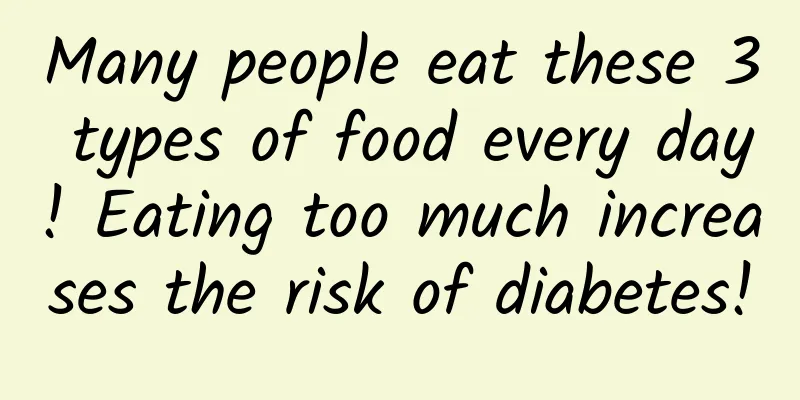Ketogenic diet is very popular, why don't you use it?

|
Author: Ruan Guangfeng The article comes from the Science Academy official account (ID: kexuedayuan) What exactly is the ketogenic diet that claims to help you lose more than 10 pounds or even dozens of pounds in a month? Is it really good to lose weight so quickly? What is Ketosis? Carbohydrates (sugar), fats, and proteins are three important energy sources for the human body. Under normal circumstances, our body will first break down carbohydrates to provide energy, followed by fats, and finally proteins. After carbohydrates (sugar) provide us with energy, they only turn into carbon dioxide and water. They do not produce any toxic or harmful substances in the body. It can be said to be a very clean energy source. Because our body has a poor ability to store sugar, if we do not eat carbohydrates for a long time, the sugar reserves stored in the muscles and liver will quickly be consumed, and the body will need to use fat to provide energy. If carbohydrates are a clean energy source, then fat is a much less clean energy source. Fat contains fatty acids, which produce a lot of acidic residues - ketones (ketone bodies) when providing energy to the human body. The process of consuming fat to generate energy and producing ketone bodies at the same time is called "ketosis". So, we can simply equate ketosis with digesting fat. Image from pixabay.com What is considered a ketogenic diet? The process of ketosis actually relies mainly on fat to provide energy. What exactly is the ketogenic diet? The "ketogenic diet" is a relatively extreme low-carbohydrate diet. The specific method is that for three meals a day, almost no staple food is eaten, but fat and protein are used for energy, ensuring that carbohydrates are not the main source of energy, which will inevitably produce a lot of ketone bodies. Ketogenic diet was originally developed to treat epilepsy? The ketogenic diet first became popular in the 1920s. At that time, there were no effective anti-epileptic drugs, so patients could only be treated by strictly limiting their carbohydrate intake to no more than 20 grams a day to simulate the body's hunger state. This amount is about the same as a small bowl of white rice. Why 20 grams? For ordinary people, when the intake of carbohydrates is less than 50 grams for 3 to 4 days, the body will use up the stored glycogen and will gradually break down a large amount of fat as an energy source. The process of breaking down fat produces fatty acids and a large amount of ketone bodies. Ketone bodies are produced in the liver, excreted by the kidneys, and flow from the blood to various organs and tissues throughout the body and the brain to provide energy. Therefore, the basic requirements of the ketogenic diet are low carbon water, high fat, and moderate protein. Specifically, it is 70~80% fat + 10~20% protein + 5~10% carbohydrates, while controlling the total daily calorie intake to about 2000 kcal. (Image from pixabay.com) The ketogenic diet is high in fat, so why can it help lose weight? The main principle of the ketogenic diet is to use fat to replace carbohydrates to provide energy for the human body. After the body consumes glucose, it starts to burn fat to provide energy for itself, and the human body enters a ketogenic state. Ultimately, the body enters a state of high-speed fat burning. Therefore, the essence of the ketogenic diet is that the body breaks down fat to produce energy in order to achieve the purpose of reducing fat and weight. Because ketosis is a weight loss method that targets fat consumption, it can quickly reduce our body fat percentage. If combined with exercise of appropriate intensity, it is not difficult to lose more than ten pounds of fat. The weight loss effect is very fast and obvious. By the end of the 20th century, the ketogenic diet was not only introduced into the treatment research of diseases such as diabetes and Parkinson's syndrome, but Dr. Robert C. Atkins of the United States also used some of its principles to create the Atkins diet, encouraging people to lose weight by not eating carbohydrates. (Image source: pixabay.com) Is the ketogenic diet a recommended way to lose weight? According to current research, the ketogenic diet can help lose weight in the short term. However, in the long term, there is no significant difference between the ketogenic diet and other diets in terms of their effects on weight. A meta-analysis published in 2006 (447 participants) also showed that although the low-carb diet group lost more weight than the low-fat diet group in the first 6 months, this difference disappeared within a year. In 2013, a meta-analysis involving 1,569 participants found that patients assigned to a low-carbohydrate diet lost more weight within six months than those assigned to a low-fat diet. But in the long term, the effect did not seem to be more significant than a traditional low-fat diet. Moreover, the advantage of a low-carbohydrate diet over a low-fat diet in terms of faster weight loss was no longer apparent after 24 months. A 2014 meta-analysis showed that various weight loss diets, whether high-carb or low-carb, have little statistical difference in long-term effects. Of course, the effects vary from person to person. The same diet may make some people lose a lot of weight, while others have no effect, which may be due to differences in genes and physical constitution. In 2017, a meta-analysis of the effects of different dietary methods (including ketogenic, DASH, etc.) on weight loss found that these methods have weight loss effects in the short term, but in the long term, the effects are not obvious, and there are no differences between different methods. (Image source: pixabay.com) In 2018, Stanford University conducted a large-scale research experiment. 632 healthy overweight adult volunteers were randomly recruited and divided into two groups. Through dietary guidance courses, they were asked to follow a low-fat and low-carb diet, and their genotypes and insulin sensitivity were tested. After 12 months of the experiment, it was found that the low-fat group lost an average of 5.3 kg, while the low-carb group lost an average of 6.0 kg. However, the difference between the two groups was not statistically significant. Another reason why the ketogenic diet is regarded as a magic pill for weight loss is the so-called appetite suppressant effect. The theoretical basis of this statement is that when the concentration of ketone bodies in the blood increases, the nerve center will suppress appetite. However, most research results show that this effect is fictitious. The reason is that we don’t know how high the blood ketone concentration must be to significantly suppress appetite. The daily ketogenic diet is far from raising the blood ketone concentration in the body to a level sufficient to suppress appetite. In general, the ketogenic diet can still help with weight loss in the short term, but in the long term, it does not have a good effect on weight control. (Image source: pixabay.com) It has no effect and may even be harmful to your health? Many people would say that the ketogenic diet is still used by many doctors. But in fact, the ketogenic diet we often mention now is not the same as the ketogenic diet used by doctors. When the ketogenic diet is used for clinical treatment, it has very strict dietary requirements. It not only requires that more than 70% of the daily energy required by the practitioner comes from fat, but also further requires that the energy supply ratio of fat and protein (referring to the calories provided by a certain nutrient to the body, as a percentage of the total calories consumed) be controlled at 4:1 or 3:1, and the calories from carbohydrate sources must be strictly controlled to less than 5% or the intake must be less than 20 grams. This means that a large apple may cause the amount of carbohydrates in that day to exceed the standard. In fact, the clinical ketogenic diet needs to be carried out under the joint supervision of doctors and nutritionists. On the one hand, it is necessary to keep the patient's body in a "ketogenic" state through supervision and monitor possible risks for timely treatment. On the other hand, it is because such an extreme diet is difficult to stick to for a long time. The ketogenic diet method on the Internet now basically only restricts carbohydrates, and other nutrients are not well controlled. There is no guidance from doctors or nutritionists, which can easily cause harm to health. At present, the possible hazards include: Acidosis is prone to occur: Ketone bodies are a slightly acidic substance. Under normal circumstances, the amount in the body is very small. However, if the ketogenic diet is adopted for a long time, the ketone bodies accumulate to a certain level, and the blood may become acidic, resulting in acidosis. Increased burden on kidneys: Excess ketone bodies in the human body must be excreted through the kidneys, so for people with kidney disease, it is absolutely forbidden to adopt a ketogenic diet, otherwise it may accelerate the development of kidney disease. For people without kidney disease, long-term high ketone bodies will also increase the burden on the kidneys, and it is hard to say whether it will cause damage to the kidneys. Severe rebound after normal diet: For those who have successfully lost weight on ketogenic diet, if they start to return to normal diet, they will find that they quickly gain weight again, and they are fatter than before losing weight. This is because the normal metabolic balance is broken due to rapid weight loss in a short period of time, and it is easy to have a retaliatory rebound. (Image source: pixabay.com) Can I adopt the ketogenic diet with a doctor's guidance? In fact, consuming too little carbohydrates is not a healthy diet and is harmful to health. Studies have found that carbohydrate intake and mortality show a "U-shaped" relationship. Eating too much or too little will significantly increase mortality. The lowest mortality rate is when carbohydrate intake is 50-55% of total energy intake. my country's dietary guidelines also believe that a diet dominated by cereals is an important feature of a balanced diet. Cereals are rich in carbohydrates, and the daily intake of cereals and tubers is 250-400 grams, including 50-150 grams of whole grains and beans, and 50-100 grams of tubers; the energy provided by carbohydrates in the diet should account for more than 50% of the total energy. In general, the ketogenic diet can only help you lose weight in the short term, but the long-term effect is not obvious. Moreover, blindly adopting the ketogenic diet may cause health damage to the body. It is for this reason that the star who successfully "lost weight with ketogenic diet" said that he might not succeed even if he tried again. Therefore, it is recommended that you do not blindly adopt the ketogenic diet to lose weight. |
>>: What are the pros and cons of eating chocolate? Is eating chocolate good for your teeth?
Recommend
Back pain, chest pain, and no menstruation yet
I have lower back pain and chest pain before my p...
Not smoking ≠ not getting lung cancer
I believe that you often see news reports like th...
Popular Science Article | "Little Premature Birth" Big Challenge, Premature Babies' "Battle of Breastfeeding"
Does your baby get tired easily when feeding? Doe...
A man accidentally fell and broke his tear duct. After more than three months, he finally stopped crying.
"It's really embarrassing for a grown ma...
After ovulation, the test paper is always pink
Every couple who get together because of love hop...
Can I drink honey water when I am pregnant?
For pregnant women, a reasonable diet is not only...
Coconut oil is healthier? Don’t believe it! I really don’t recommend eating it. Anyone who believes it will be cheated!
Myth: "Coconut oil is healthier" Coconu...
Inducing lactation and removing fetal toxins, good news for mothers
Many mothers may encounter this problem to a grea...
A woman fainted after taking a long hot bath! Doctor: 4 ways to help you prevent it effectively!
If you take a hot bath in a closed bathroom for a...
What is the cause of long-term vaginal itching?
For many people, genital itching is a common symp...
Will I have my period if I don't ovulate?
Female anovulation is a common gynecological symp...
The reason why a woman suffers from heel pain
I believe that many people have experienced heel ...
What is the cause of vulvar leukoplakia
Vulvar leukoplakia makes many women panic. In fac...
The most obvious symptoms before menstruation
Menstruation is a physiological phenomenon that o...









